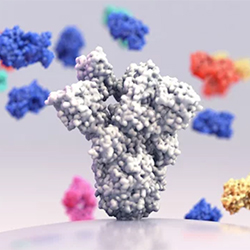By David Doolittle
Continuing to control the spread of COVID-19, cutting prescription drug prices, curbing substance use disorder and developing a new federal agency that will work to improve the health of all Americans—in part by fighting cancer head-on—are among the key health initiatives President Joe Biden laid out in his State of the Union address on March 1.
Although he gave few specific details on many of those initiatives, Mr. Biden said he will work toward keeping Americans healthy, lowering costs, boosting the economy and ensuring care for everyone.

“If we want to go forward—not backward—we must protect access to healthcare,” Mr. Biden said in his speech, which focused on several major healthcare challenges that his administration plans to tackle.
Cancer
Building on the administration’s announcement last month that it will reignite and strengthen the “Cancer Moonshot” launched in 2016, the president called on lawmakers to fund a proposed health agency called the Advanced Research Projects Agency for Health, or ARPA-H.
The ARPA-H, which would be a component of the National Institutes for Health, will invest in key health-related research projects, according to the NIH’s website.
“Our goal is to cut the cancer death rate by at least 50% over the next 25 years, turn more cancers from death sentences into treatable diseases,” Mr. Biden said.
“ACCC applauds President Biden for renewing the Cancer Moonshot and setting the ambitious goals of reducing cancer mortality while improving the experience of patients living with cancer. We appreciate that this relaunch draws more focus upstream in the cancer care continuum to improve prevention and screening and aims to decrease inequities in access and outcomes. As part of the Cancer Moonshot relaunch, ACCC also urges the Biden administration to find ways to reinforce the oncology workforce and to ensure that innovations in screening, diagnosis, and treatment are accessible to all patients,” the Association of Community Cancer Centers said in a statement.
The agency will be modeled after the Defense Advanced Research Projects Agency, which for decades has invested in technologies such as the internet, GPS, self-driving cars and the development of messenger RNA vaccines, the White House said on its website.
According to the NIH, initiatives the proposed agency will help develop include:
- cancer-preventing vaccines that use messenger RNA to recognize common genetic mutations that drive cancers;
- processes to create patient-specific T cells that recognize and destroy malignant cells; and
- molecular “zip codes” that target a drug or gene therapy vector to any specific tissue and cell type.
Mr. Biden also announced that his administration will expand Veterans Affairs eligibility to veterans suffering from nine respiratory cancers that could be linked to toxic exposures in Iraq and Afghanistan.
“This is personal to me … and to so many of you,” said Mr. Biden, whose son Beau died of cancer in 2015. “Let’s end cancer as we know it.”
In addition to cancer, the ARPA-H will also aid research and treatments for illnesses such as Alzheimer’s disease and diabetes as well as ensuring healthcare access, equity and quality.
For example, the agency will work to reduce maternal morbidity and mortality “by identifying those at highest risk for pregnancy complications and providing ethically integrated, regular virtual house calls by nurses and midwives, from early in pregnancy through at least 6 months postpartum,” the NIH said.
It will also aid research to develop accurate and inexpensive wearable health monitors, such as smartwatches, to monitor blood pressure, blood sugar and more, according to the NIH. It also will fund advances of brain imaging and blood biomarkers to advance potential Alzheimer’s disease therapies.
Mr. Biden’s fiscal year 2022 budget calls for $6.5 billion to fund the agency for three years.
COVID-19
“I know some are talking about ‘living with COVID-19.’ Tonight, I say that we will never just accept living with COVID-19,” Mr. Biden said. “Because of the progress we’ve made, because of your resilience and the tools we have, tonight I can say we are moving forward safely, back to more normal routines.”
Specifically, Mr. Biden outlined four steps that his administration will take in the effort to control COVID-19:
- Continued development and access to vaccines and treatments, including progress on vaccines for children younger than 5 years. He also announced a “Test to Treat” initiative in which people who test positive at a pharmacy will automatically receive antiviral medications at no cost.
- Preparation for new variants and securing more federal funding for new stockpiles of tests, masks and medications. “I cannot promise a new variant won’t come. But I can promise you we’ll do everything within our power to be ready if it does,” Mr. Biden said.
- Keeping schools and businesses open.
- Continuing to provide vaccines to other countries. “We’ve sent 475 million vaccine doses to 112 countries, more than any other nation,” he said. “And we won’t stop.”
Prescription Drug Prices
Citing the hardships of a 13-year-old boy named Joshua and his father, who both take insulin daily to help control type 1 diabetes, Mr. Biden called for cuts to prescription drugs to improve Americans’ health while boosting the economy.
“For Joshua, and for the 200,000 other young people with type 1 diabetes, let’s cap the cost of insulin at $35 a month so everyone can afford it,” he said. “Drug companies will still do very well. And while we’re at it, let Medicare negotiate lower prices for prescription drugs, like the VA already does.”
Almost 20 million Americans older than 12 years of age struggled with substance use disorder, and 38% of adults struggled with an illicit drug use disorder in 2017, according to the American Addiction Centers.
To battle this health crisis, Mr. Biden called for increased funding for prevention, treatment, harm reduction and recovery programs across the country.
He also called for lawmakers to overturn “outdated rules that stop doctors from prescribing treatments.”
ASHP, which represents more than 60,000 health-system pharmacists nationwide, applauded Mr. Biden’s call to increase access to medications for opioid use disorder (MOUDs).
“Congress should start by passing the Mainstreaming Addiction Treatment Act to eliminate the federal barrier known as the X-waiver,” Tom Kraus, ASHP's vice president of government relations, said in a statement. “This would significantly improve the ability of healthcare providers to prescribe MOUDs for patients who need them.”




